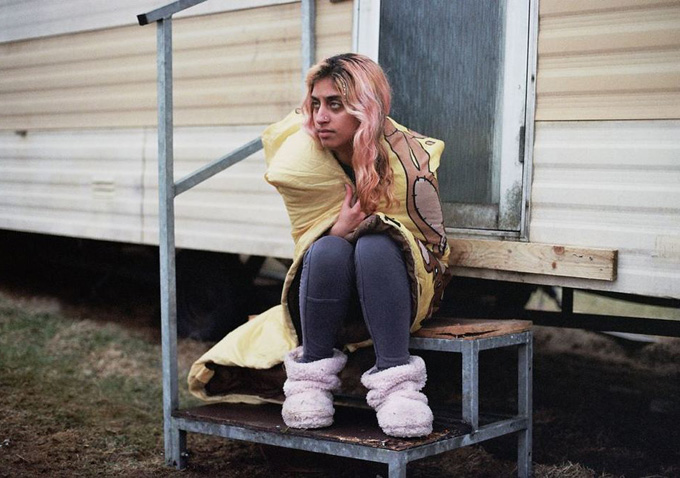 This is a reprint of our review from the 2014 Cannes Film Festival.
This is a reprint of our review from the 2014 Cannes Film Festival.
Though appearances in main Competition tend to be restricted to the Loaches and Leighs of the world, the British film industry has done well by the sidebars at Cannes in recent years. Films like "Hunger," "Sightseers" and "The Selfish Giant" all premiered in Un Certain Regard or Directors’ Fortnight, and number among the very best films to come out of the U.K. in recent years.
This year, along with Andrew Hulme‘s "Snow In Paradise," the hopes of Britannia rest on "Catch Me Daddy," screening at the Cannes Directors’ Fortnight. The film marks the feature directorial debut of music video helmer Daniel Wolfe (who also co-wrote with his brother, Matthew, who in turn also scores the film, a close enough collaboration that the credits introduce the picture as "A Film By Daniel & Matthew Wolfe"), best known for his work with Plan B and perhaps most notably, that The Shoes video where Jake Gyllenhaal played a serial killer (watch it here). Centering around the button-pushing issues of honor killings in the Muslim community, it’s an ambitious attempt to meld the kind of social realism that made the names of Andrea Arnold and Clio Barnard with a stripped-down genre thriller, an attempt that’s only moderately successful, though it suggests Wolfe is a filmmaker of real promise.

On the Yorkshire moors, Billy, a coke-addled middle aged-man (Gary Lewis, best known for "Billy Elliot") is recruited for a job by Barry (Barry Nunney), a former nightclub bouncer. In Leeds, four men of Pakistani heritage, led by Zaheer (Ali Ahmad) assemble. And in a caravan on the outskirts of Sheffield, Laila (Sabeema Jameen Ahmed) and Aaron (Conor McCarron) are trying to live a quiet life, which mostly involves getting high off their faces on codeine. As it soon becomes clear, Laila ran away from her strict father to be with Aaron, and her brother Zaheer, newly returned from Pakistan, has been tasked with bringing her home.
The opening scenes of the film, as the Wolfes put their pieces into play, are remarkably strong. There’s a gritty authenticity to the world we’re in, and every character gets a promising degree of texture as their part in proceedings is gradually revealed. Wolfe shows an admirable aversion to exposition, simply laying out events and trusting his audience enough to fill in the blanks. And it seems like the meld of genres is working, too. Even as Laila and Aaron seem happy and untroubled in the early scenes, there’s an ominous note to proceedings, not least from the Chekhov’s gun placed in Barry’s glove compartment early on. As the investigations of Zaheer and co. bring them to Sheffield, ever closer to their quarries, the tension cranks up, and a magnetic, beautifully edited scene that crosscuts Laila and Aaron dancing together to Patti Smith‘s "Horses" with the approach of their hunters, is almost unbearable.

It’s pretty much immediately after this point that the film starts to slide downhill, and what was once an intriguing meld becomes something closer to a straight-up chase thriller, as Aaron and Laila flee across the moors back to Leeds. It’s still tense and exciting in the moment, but begins to strain the credulity the film’s worked so hard to establish, with the characters becoming faceless pursuers, and Laila losing what little agency she had. It’s still reasonably gripping stuff, but simply becomes less interesting as it goes on, culminating on an ambiguous note that feels less like it has a point to make, and more that the filmmakers had no idea how to end things.
It does squander a certain amount of its promise, then, but there is a lot of promise. Wolfe does have a great eye and feel for atmosphere, in part thanks to the contribution of Robbie Ryan ("Fish Tank," "Wuthering Heights," "Philomena"), one of the best cinematographers working today. Like many of the best DPs, darkness seems to interest Ryan as much as light as his career’s developed, and the stunning, twi-lit work he does here might be his best ever. The score, by Matthew Wolfe and ambient musician Daniel Thomas Freeman, is also excellent, although song cues seem a little more randomly assembled, feeling more like a collection of the director’s favorites rather than ones that fit the material (one of several things that perhaps emphasizes that this is a first film).

Wolfe also appears to have a real facility with actors, as the performances here are strong across the board, if occasionally a little hamstrung by the need to run and scream. In general, he’s a director with enormous promise, one who could join the likes of Wheatley, Arnold and Peter Strickland in this new wave of British directors. We just hope he irons out some of the bumps with his second feature. [B]

